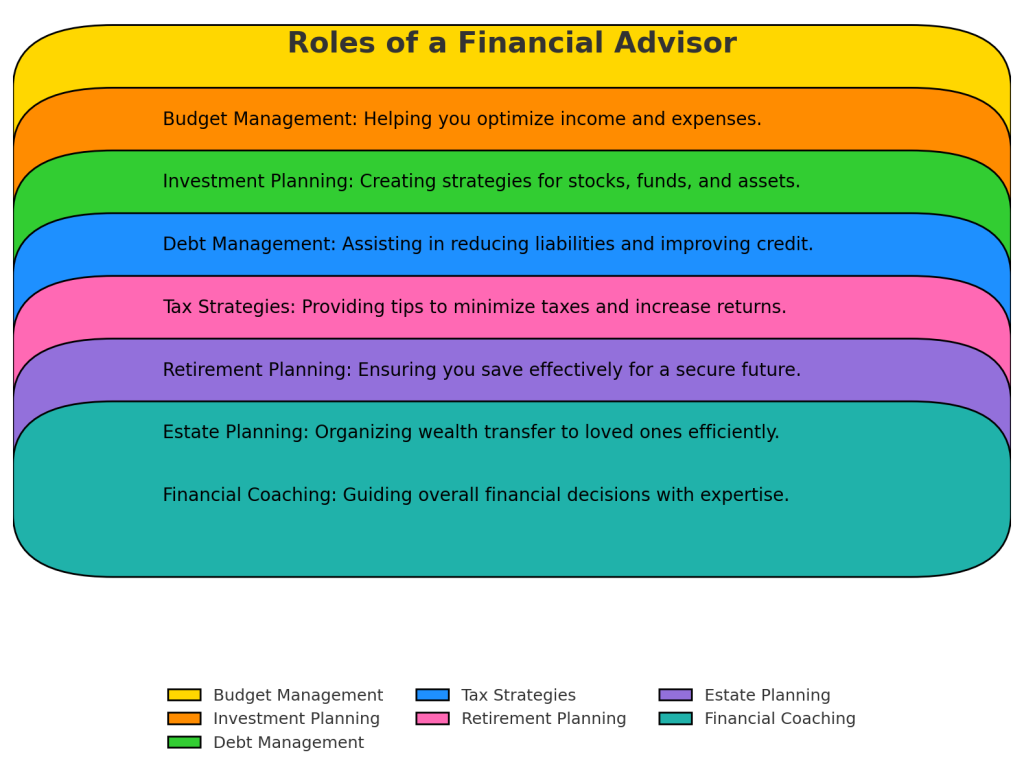Unlocking Financial Success: Why You Need a Finance Advisor
Managing personal finances effectively is crucial in today’s fast-paced and ever-changing economic landscape. A Finance Advisor can be the key to achieving your financial goals, whether you’re planning for retirement, saving for a big purchase, or growing your investments. In this comprehensive guide, we’ll delve into the world of financial advising, answering common questions, and offering actionable insights to help you decide why working with a Finance Advisor is essential for your financial success.
What Is a Finance Advisor?
A Finance Advisor is a professional who helps individuals and businesses manage their financial resources effectively. They provide guidance on investments, retirement planning, tax strategies, and other financial matters to help clients make informed decisions and secure their financial future.
Key Roles of a Finance Advisor:
- Investment Management: Helping clients build and manage a diversified portfolio.
- Financial Planning: Crafting a roadmap for short-term and long-term goals.
- Risk Assessment: Identifying and mitigating financial risks.
- Tax Efficiency: Developing strategies to minimize tax liabilities.
- Retirement Planning: Ensuring clients have a secure and comfortable retirement.
Why Do You Need a Finance Advisor?
Many people wonder whether hiring a Finance Advisor is worth the investment. The truth is, a Finance Advisor provides tailored advice that can save you time, money, and stress. Here are some of the most compelling reasons why you need one:
1. Clarity in Financial Goals
A Finance Advisor helps you define clear financial objectives, whether it’s saving for your children’s education or buying your dream home.
2. Personalized Strategies
No two financial situations are the same. Advisors create customized strategies based on your unique financial circumstances.
3. Expert Insights
Finance Advisors stay up-to-date with market trends and regulations, ensuring you get informed advice.
4. Time Savings
Managing finances can be time-consuming. A Finance Advisor handles the complexities, giving you more time to focus on what matters.

Finance Advisor: Your Guide to Financial Success | Expert Tips
Questions People Ask About Finance Advisors
1. What Does a Finance Advisor Do?
A Finance Advisor evaluates your financial situation and develops a comprehensive plan to achieve your goals. They also monitor your progress and adjust strategies as needed.
2. How Much Does a Finance Advisor Cost?
The cost varies based on the services provided. Some charge a flat fee, while others take a percentage of the assets they manage.
3. When Should I Hire a Finance Advisor?
You should consider hiring a Finance Advisor during major life events, such as marriage, starting a family, or nearing retirement.
4. Can I Manage My Finances Without a Finance Advisor?
While some individuals successfully manage their finances independently, a Finance Advisor brings expertise that can lead to better financial outcomes.
How to Choose the Right Finance Advisor
Finding the right Finance Advisor is crucial to achieving your goals. Here’s what to look for:
1. Credentials
Look for advisors with certifications such as Certified Financial Planner (CFP) or Chartered Financial Analyst (CFA).
2. Experience
Choose an advisor with a proven track record in the areas you need help with, such as retirement planning or investment management.
3. Fee Structure
Understand how the advisor charges for their services and ensure it aligns with your budget.
4. Compatibility
Your Finance Advisor should be someone you trust and feel comfortable working with.
The Benefits of Working with a Finance Advisor
1. Achieve Financial Freedom
A Finance Advisor helps you set achievable goals and provides the guidance needed to reach them.
2. Minimize Risks
Advisors help you diversify your investments and plan for uncertainties.
3. Stay on Track
With regular check-ins and updates, advisors keep you aligned with your financial plan.
The Future of Financial Advising: Embracing Technology
The financial advisory landscape is evolving rapidly, with technology playing a central role. Robo-advisors and advanced financial planning tools are now complementing traditional financial advisory services.
Benefits of Technology in Financial Advising:
- 24/7 Access: Manage your finances anytime, anywhere.
- Cost Efficiency: Lower fees compared to traditional advisory services.
- Data-Driven Insights: Access to real-time financial data and analytics.
Common Myths About Finance Advisors
Myth 1: Only Wealthy People Need a Finance Advisor
Fact: Finance Advisors help people across all income levels.
Myth 2: Finance Advisors Are Expensive
Fact: Many advisors offer affordable options tailored to different budgets.
Myth 3: Finance Advisors Just Sell Investments
Fact: Advisors provide holistic financial guidance, from budgeting to estate planning.
How to Get Started with a Finance Advisor
- Assess Your Needs: Identify the areas where you need financial guidance.
- Research Advisors: Look for certified professionals with good reviews.
- Schedule Consultations: Meet potential advisors to find the right fit.
- Start Small: Begin with basic services and expand as your financial needs grow.
SEO Tips for Finding the Best Finance Advisor Online
When searching for a Finance Advisor, use specific keywords like “best Finance Advisor near me” or “affordable Finance Advisor services.” Read online reviews and testimonials to make an informed decision.
Frequently Asked Questions About Finance Advisors
1. How Can a Finance Advisor Help Me Save Money?
Finance Advisors optimize your spending, saving, and investing strategies, helping you build wealth over time.
2. Are Finance Advisors Regulated?
Yes, most Finance Advisors are regulated by financial authorities to ensure they act in their clients’ best interests.
3. What’s the Difference Between a Finance Advisor and a Financial Planner?
While the terms are often used interchangeably, financial planners focus more on long-term strategies, while advisors may also handle investments.
4. Can I Switch Finance Advisors?
Yes, if you’re unsatisfied with your current advisor, you can switch to one that better meets your needs.
Take Control of Your Financial Future
A Finance Advisor is more than just a professional; they are your partner in financial success. Whether you’re just starting your financial journey or looking to optimize your existing strategies, working with a Finance Advisor can make a world of difference. Take the first step today by finding a qualified advisor to guide you toward your goals.
Take the first step toward financial freedom today! Contact a certified Finance Advisor and start building the future you deserve. Click here to schedule a free consultation.
The Ultimate Guide to Hiring a Finance Advisor: Everything You Need to Know
In today’s fast-paced world, managing your finances effectively is more important than ever. Whether you’re planning for retirement, saving for a big purchase, or trying to get out of debt, a Finance Advisor can be a game-changer. But what exactly does a finance advisor do, and how do you find the right one for your needs? Let’s dive into the essentials.
What Is a Finance Advisor?
A Finance Advisor is a professional who helps individuals and businesses manage their money effectively. From budgeting and investing to planning for major life events, they provide guidance tailored to your financial situation. Their goal is to help you achieve both short-term and long-term financial objectives.
Why Do You Need a Finance Advisor?
1. Expert Financial Guidance
Managing finances isn’t as simple as it seems. A finance advisor brings expertise to the table, ensuring you make informed decisions about investments, taxes, and retirement plans.
2. Time-Saving
If you’re juggling a busy schedule, keeping track of your finances can fall to the wayside. A finance advisor takes that burden off your shoulders.
3. Customized Plans
Whether you’re saving for your child’s education or planning a dream vacation, a finance advisor creates personalized strategies to help you reach your goals.
Common Questions About Finance Advisors
Q: How do I know if I need a finance advisor?
If you’re struggling to meet your financial goals, lack investment knowledge, or need help managing debt, hiring a finance advisor is a wise choice.
Q: How much does a finance advisor cost?
Finance advisors charge differently. Some work on a flat fee, others on an hourly rate, and some earn commissions on investments. It’s essential to understand the fee structure before committing.
Q: Can’t I just use financial software instead?
While tools like budgeting apps and robo-advisors are helpful, they lack the personalized touch and expert insight that a human finance advisor provides.
Key Qualities to Look for in a Finance Advisor
- Credentials
Look for certifications like CFP (Certified Financial Planner) or CFA (Chartered Financial Analyst). These indicate that the advisor has met rigorous industry standards. - Transparency
A good finance advisor is open about their fees and services. Avoid those who pressure you into unnecessary investments. - Communication Skills
Your finance advisor should be approachable and able to explain complex concepts in a way that makes sense to you. - Track Record
Check their reviews, testimonials, or ask for references to gauge their expertise and reliability.
How to Find the Right Finance Advisor
1. Ask for Recommendations
Friends, family, or colleagues who’ve worked with a finance advisor can provide valuable insights.
2. Use Professional Networks
Websites like the National Association of Personal Financial Advisors (NAPFA) or Certified Financial Planner Board of Standards are excellent resources for finding qualified professionals.
3. Interview Multiple Advisors
Don’t settle on the first advisor you meet. Schedule consultations with a few to find one who aligns with your goals and communication style.
4. Evaluate Their Fees
Make sure you understand how your advisor is compensated and whether it aligns with your financial priorities.
Mistakes to Avoid When Hiring a Finance Advisor
- Skipping the Research Not all finance advisors are created equal. Avoid hiring someone without thoroughly vetting their credentials and background.
- Focusing Only on Cost While affordability matters, the cheapest option isn’t always the best. Quality advice often justifies a higher fee.
- Ignoring Red Flags If an advisor makes unrealistic promises or pushes high-risk investments without proper explanation, proceed with caution.

Finance Advisor vs. Financial Planner: What’s the Difference?
The terms are often used interchangeably, but they aren’t the same.
- Finance Advisor: A broad term that encompasses any professional offering financial guidance, from investment strategies to estate planning.
- Financial Planner: Focuses specifically on creating comprehensive plans to help clients achieve long-term goals.
Both roles are valuable, but your choice should depend on your specific needs.
How a Finance Advisor Can Help You Invest
Investing is a critical component of building wealth, but it can be daunting. A finance advisor helps by:
- Assessing your risk tolerance.
- Diversifying your portfolio.
- Monitoring market trends to maximize returns.
For beginners, this guidance is invaluable in avoiding common investment pitfalls.
How to Maximize Your Relationship with a Finance Advisor
- Set Clear Goals Know what you want to achieve—be it debt reduction, retirement planning, or wealth accumulation.
- Be Honest Your advisor can only help if they have an accurate picture of your financial situation.
- Stay Involved While your advisor handles the details, keep track of your progress and ask questions.
FAQs About Working with a Finance Advisor
Q: Can a finance advisor help with taxes?
Yes! Many finance advisors specialize in tax planning, helping you minimize liabilities and take advantage of deductions.
Q: Do I need a finance advisor if I’m already financially stable?
Even if your finances are in great shape, an advisor can help you optimize investments and prepare for future expenses.
Q: How often should I meet with my finance advisor?
At least annually, but more frequently if you’re navigating major life changes like a career shift or marriage.
Is a Finance Advisor Worth It?
Hiring a Finance Advisor can be one of the best decisions you make for your financial health. They bring expertise, save you time, and help you achieve your financial goals with less stress. Whether you’re navigating complex investments or just starting to budget, their guidance can set you on the path to success.
Ready to take control of your financial future? Start researching finance advisors today and find the perfect match for your needs. Your financial peace of mind is worth it!
The Role of a Finance Advisor: More Than Numbers
A Finance Advisor isn’t just about crunching numbers. They act as your financial coach, strategist, and cheerleader. From crafting budgets to mastering investments, their work ensures your financial health stays on track.

Services Provided by Finance Advisors:
- Budget Management: Tailored strategies to optimize your income and expenses.
- Investment Planning: Guidance on stocks, mutual funds, and retirement accounts.
- Debt Management: Help in reducing liabilities and improving credit scores.
- Tax Strategies: Tips to legally minimize taxes and maximize returns.
- Estate Planning: Organizing wealth transfer to loved ones efficiently.
Top Benefits of Working with a Finance Advisor
1. Expert Knowledge
Finance advisors have the expertise to navigate complex financial landscapes, giving you confidence in decisions.
2. Stress-Free Financial Planning
No more sleepless nights wondering about savings or investments. Advisors take the burden off your shoulders.
3. Tailored Advice
Your financial goals are unique, and advisors create personalized strategies to match them.
4. Long-Term Perspective
While you focus on day-to-day finances, your advisor ensures you’re set up for a stable future.
5. Improved Financial Outcomes
Studies show that people with professional financial guidance often see higher returns on investments and better money management.
When Should You Hire a Finance Advisor?
Timing matters when it comes to seeking financial advice. Here are key life moments when a finance advisor can add immense value:
- Starting Your Career: Build a strong financial foundation from day one.
- Marriage: Combine finances, plan joint goals, and prepare for a family.
- Buying a Home: Navigate mortgages and secure affordable financing options.
- Retirement Planning: Ensure your nest egg lasts a lifetime.
- Inheritance or Windfalls: Make wise decisions with newfound wealth.
Finance Advisor Fee Structures: What to Expect
Understanding how finance advisors charge is essential to avoid surprises. Common fee models include:
- Flat Fee: A fixed rate for specific services or plans.
- Hourly Rate: Ideal for one-time consultations or short-term advice.
- Percentage of Assets Managed: Advisors charge a percentage of the assets they manage for you (typically 0.5%-2% annually).
- Commission-Based: Advisors earn a commission from financial products they recommend.
Pro Tip: Always clarify fee structures during your initial consultation to avoid misunderstandings.
How to Find the Perfect Finance Advisor for You
1. Research and Recommendations
Start with trusted recommendations from friends, family, or professional networks. Online reviews and ratings on sites like NAPFA and CFP Board are also valuable.
2. Check Qualifications
Verify their certifications. Popular credentials include:
- Certified Financial Planner (CFP)
- Chartered Financial Analyst (CFA)
- Certified Public Accountant (CPA)
3. Assess Compatibility
Schedule interviews to gauge their expertise, communication style, and understanding of your goals.
4. Look for Fiduciary Duty
A fiduciary is legally bound to act in your best financial interest—an essential quality in an advisor.
Matplotlib Chart

Here is an infographic illustrating the various roles of a financial advisor, from budget management to estate planning. Let me know if you’d like any modifications or enhancements!
Common Myths About Finance Advisors
Myth 1: Only the Wealthy Need a Finance Advisor
Reality: Anyone can benefit from financial advice, whether you’re starting with $10,000 or managing millions.
Myth 2: Finance Advisors Only Handle Investments
Reality: Advisors offer holistic financial services, from budgeting to estate planning.
Myth 3: Financial Software is Just as Good
Reality: While tools can assist, they lack the personalized touch and strategic foresight a human advisor provides.
Questions to Ask Before Hiring a Finance Advisor
- What services do you specialize in?
- Are you a fiduciary?
- What is your fee structure?
- Can you provide references or testimonials?
- How will you measure my financial progress?
Tips for a Productive Relationship with Your Finance Advisor
- Be Transparent: Share your financial details openly.
- Set Clear Goals: Define what success looks like for you.
- Stay Involved: Regularly review your financial plan and ask questions.
- Provide Feedback: Let your advisor know what’s working and what isn’t.
The Future of Finance Advising: Embracing Technology
Modern finance advisors use cutting-edge tools like AI-driven analytics and digital dashboards to offer:
- Real-time portfolio monitoring.
- Predictive financial insights.
- Secure online consultations.
This blend of technology and human expertise ensures seamless financial planning.
Your Financial Journey Starts Here
A Finance Advisor is more than just a professional—they’re a partner in your financial success. Whether you’re navigating investments, managing debt, or preparing for retirement, their expertise can make the journey smoother and more rewarding.
Invest in your future today by connecting with a finance advisor who understands your goals and values. Take the first step toward financial empowerment—you deserve it!
Financial planning today differs significantly from the past due to technological advancements, changing economic landscapes, and evolving consumer needs. Here’s a detailed look at how financial planning has transformed:
1. Digital Transformation
Modern financial planning leverages advanced technology to provide faster, more accurate, and accessible services.
- Robo-Advisors: Automated platforms offer algorithm-driven investment and financial advice with low fees.
- Financial Apps: Tools like budgeting apps, expense trackers, and investment platforms allow individuals to manage finances in real-time.
- AI & Big Data: Advanced analytics enable personalized financial strategies by analyzing spending patterns and market trends.
2. Evolving Consumer Expectations
Today’s consumers demand more personalized and transparent financial advice.
- Customization: Plans are tailored to individual goals, whether it’s early retirement, entrepreneurship, or sustainable investing.
- Transparency: Advisors now prioritize clear communication about fees, risks, and potential outcomes.
- Focus on Financial Wellness: Beyond wealth, there’s an emphasis on reducing financial stress and improving overall well-being.
3. Broader Scope of Services
Financial planning today covers a wider range of needs due to changing life priorities.
- Sustainability: Many individuals seek investment options aligned with their values, such as ESG (Environmental, Social, and Governance) investing.
- Gig Economy: With more people freelancing, financial planning includes irregular income management, tax strategies, and independent retirement savings.
- Healthcare Costs: Rising medical expenses have made healthcare planning a crucial part of financial advice.
4. Economic Uncertainty
The world has faced unprecedented economic challenges in recent years, impacting financial planning approaches.
- Inflation and Recession Preparation: Advisors now prioritize strategies to hedge against inflation and prepare for economic downturns.
- Globalization: Investments and financial strategies are increasingly global, considering international markets and currencies.
5. Focus on Lifelong Learning
Financial literacy has become a cornerstone of modern financial planning.
- Educational Resources: Advisors often provide workshops, webinars, and tools to improve clients’ financial knowledge.
- Empowering Clients: The goal is to empower individuals to make informed financial decisions rather than solely relying on an advisor.
6. Regulatory Changes
Increased regulation ensures better consumer protection in financial planning.
- Fiduciary Duty: Many advisors are now legally obligated to act in the best interests of their clients.
- Transparency in Fees: Stricter regulations mandate clearer disclosure of costs and commissions.
7. Integration with Life Planning
Financial planning has become more holistic, aligning closely with personal and professional goals.
- Life Transitions: Plans adapt to key life events, such as career changes, marriage, and caregiving responsibilities.
- Work-Life Balance: Advisors increasingly consider the financial implications of lifestyle choices, such as sabbaticals or starting a business.
8. Accessibility and Inclusivity
Financial planning is now accessible to a wider audience.
- Lower Barriers to Entry: Digital tools and lower-cost advisory options make financial planning available to individuals with smaller incomes or portfolios.
- Diversity and Inclusion: Advisors focus on catering to underrepresented groups, understanding cultural nuances, and addressing unique financial challenges.
Conclusion
Financial planning today is dynamic, adaptive, and more inclusive than ever before. It combines cutting-edge technology, personalized strategies, and a broader focus on well-being to meet the diverse needs of modern consumers. Whether you’re managing student debt, navigating retirement, or building generational wealth, today’s financial planning has tools and expertise to guide you effectively.



